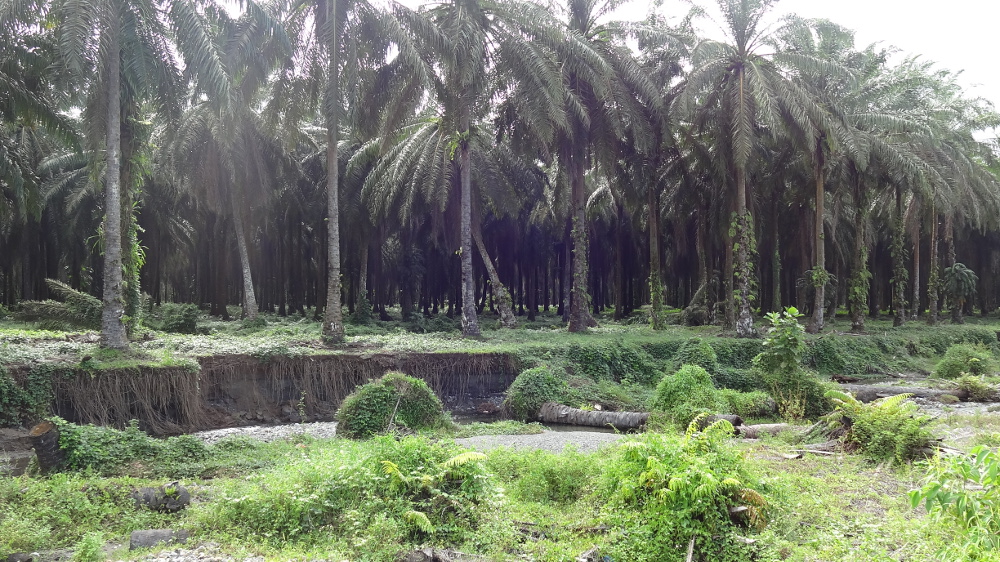 Bulan Mei lalu, perkebunan dan pabrik minyak sawit milik PTPN II dijual kepada sebuah perusahaan swasta asal Cina, PT Yongjing Investindo. PTPN II sudah beroperasi di daerah Prafi-Manokwari sejak tahun 1982 namun sekarang banyak pohon sawit sudah lewat usia produktif 25 tahun. Dari areal ditanam sawit sebagian besar adalah lahan plasma milk petani yang didatangkan ke Papua dalam program transmigrasi. Mereka jual hasil panen kepada perusahaan untuk diolah di pabrik. Sekarang pemerintah provinsi ingin meluncurkan program yang akan membantu para petani untuk menanam kembali pohon kelapa sawit yang sudah tidak produktif.
Bulan Mei lalu, perkebunan dan pabrik minyak sawit milik PTPN II dijual kepada sebuah perusahaan swasta asal Cina, PT Yongjing Investindo. PTPN II sudah beroperasi di daerah Prafi-Manokwari sejak tahun 1982 namun sekarang banyak pohon sawit sudah lewat usia produktif 25 tahun. Dari areal ditanam sawit sebagian besar adalah lahan plasma milk petani yang didatangkan ke Papua dalam program transmigrasi. Mereka jual hasil panen kepada perusahaan untuk diolah di pabrik. Sekarang pemerintah provinsi ingin meluncurkan program yang akan membantu para petani untuk menanam kembali pohon kelapa sawit yang sudah tidak produktif.
Dibawah ada sebuah artikel dari web Bintang Papua tentang program peremajaan dan juga (sebagai informasi latar belakang) artikel lain dari web Radar Sorong bulan Mei lalu tentang proses lelang yang dianggap bermasalah oleh Yan Christian Warinussy, Direktur Eksekutif LP3BH Manokwari.
Peremajaan Kebun Sawit Prafi Libatkan 4.400 Petani
MANOKWARI – Sebanyak 4.400 petani kelapa sawit di dataran Prafi direncanakan masuk sebagai peserta program revitalisasi perkebunan tahun 2014. Melalui program ini, para petani akan diberi kemudahan mendapatkan pinjaman lunak dari bank guna meremajakan kebun sawit plasma milik mereka yang sudah tidak produktif.
Dari sekitar 8000 hektar kebun sawit plasma milik petani di Prafi dan sekitarnya, sekitarnya 50 persen diantaranya sudah tidak produktif lagi karena sudah berusia di atas 25 tahun.Kepala dinas perkebunan provinsi Papua Barat Agus F. Wally mengungkapkan, pihaknya telah melakukan pendataan terhadap petani yang akan menjadi peserta program yang diluncurkan kementerian pertanian tersebut.
“Kita masih tunggu keputusan dari kementerian pertanian. Tapi nanti peremajaan dilakukan secara bertahap sesuai tahun tanamnya, “ ujar Agus di kantornya, Kamis (25/9).Program revitalisasi perkebunan tersebut, menurut Agus, sudah mengalami perpanjangan sebanyak 2 kali, masing-masing pada periode 2006/2010 dan 2010/2014. Perpanjangan dilakukan karena pada periode sebelumnya tidak banyak petani yang ikut di dalamnya.
“Sasaran program ini ada dua yaitu peremajaan dan perluasan (lahan). Kalau di PT Medco (beroperasi di wilayah Masni dan Sidey), mereka ambil yang perluasan, “ jelasnya.
Seperti telah diberitakan sebelumnya, PT Yongjing Investindo selaku pemegang hak guna usaha perkebunan sawit di Prafi menggantikan PTPN II juga akan meremajakan (replanting) kebun inti seluas 2.200 hektar yang sudah tidak produktif lagi. Kebun inti yang masih produktif diperkirakan hanya sekitar 20 persen.
Usulan agar dilakukan peremajaan kebun inti juga sebelumnya sudah disuarakan oleh ketua kontak tani dan nelayan andalan kabupaten Manokwari Dorteis Paiki pada saat temu wicara petani dengan Bupati Bastian Salabai di SP-4, distrik Prafi baru-baru ini.
Bupati ketika itu mengatakan, Pemda akan berkoordinasi dengan manajemen PT Yongjing agar proses peremajaan bisa secepatnya dilakukan. Termasuk mendorong perusahaan asal Tiongkok itu agar tidak mengabaikan hak-hak karyawan maupun para petani dan masyarakat adat setempat.
…
Lelang Aset PTPN II Prafi Dipertanyakan
Warinussy Minta KPK dan Kejati Papua Perlu Cek Proses Lelang
Selasa, 20 Mei 2014
MANOKWARI – Komisi Pemberantasan Korupsi (KPK) dan Kejaksaan Tinggi Papua perlu segera menyelidiki proses lelang aset perkebunan kelapa sawit milik PTP Nusantara II Unit Kebun di Prafi-Manokwari, Papua Barat yang telah berlangsung pada Jum’at (9/5) lalu. Pasalnya proses lelang tersebut diduga tidak sesuai prosedur sebagaimana diatur di dalam aturan perundangan yang berlaku (Peraturan Presiden No.54 Tahunb 2010 tentang Pengadaan Barang/Jasa Pemerintah). Hal ini disampaikan Yan Cristian Warinussy, Direktur Eksekutif LP3BH Manokwari. Dikatakan advokat senior ini, pemenang lelang aset PT PN II Unit Prafi adalah PT. Yong Jing Investment (YJI), sebuah perusahaan asal Cina. Sangat aneh karena lelang terjadi dengan harga penawaran Rp. 80,3 miliar rupiah yang diduga jauh di bawah harga hasil penghitungan oleh PT.Sucofindo yang berkisar sekitar Rp 114 miliar lebih, ungkap Warinussy kepada wartawan, Senin (19/5).
Peserta lelang, lanjut Yan, juga cuma satu yaitu PT.YJI dan pengumuman lelang terjadi pada 30 April 2014 dan lelang dilaksanakan 9 Mei yang jaraknya hanya satu minggu 2 (dua) hari saja. Sementara itu, PT.YJI sendiri menurut data yang ada telah pernah melakukan transaksi jual-beli atas kebun PTP II Prafi beserta aset-asetnya dengan PT. Papua Doberay Mandiri (PADOMA), Badan Usaha Milik Daerah (BUMD) Propinsi Papua Barat. Hal itu tertera dalam dokumen perjanjian pengikatan pembelian tanah kebun Prafi dan aset-aset yang dibuat tanpa ada tanggal dan nama tempat perjanjian itu dibuat, tapi telah ditandatangani oleh Presiden Direktur PT.YJI Mr.Lu Bao Min selaku pembeli (Purchase) dan Direktur Utama PT.Padoma H.Mamad Suhadi selaku Penjual (Vendor), jelasnya.Sayangnya, lanjut Warinussy, di dalam dokumen tersebut sama sekali tidak disebutkan nilai jual-beli kebun berseta aset PTP II Prafi tersebut, namun dokumen itu turut ditandatangani oleh Ir. Marthen Luther Rumadas selaku Sekretaris Daerah Propinsi Papua Barat waktu itu. Sedangkan Gubernur Papua Barat sendiri tidak membubuhkan tanda tangannya di dalam dokumen tersebut. Dengan demikian KPK ataupun Kejati Papua dapat menyelidiki kasus ini dengan meminta keterangan dari Mamad Suhadi maupun Rumadas serta Gubernur Papua Barat Abraham Octavianus Atururi,†harapnya.Yang menjadi pertanyaan,lanjut Direktur Eksekutif LP3BH ini, dasar hukumnya sehingga Mamad Suhadi bisa menandatangani perjanjian jual-beli kebun Prafi. Sedangkan Kebun Prafi bukan merupakan aset milik PT.Padoma dan juga belum menjadi aset Pemerintah Propinsi Papua Barat, karena sedang diaudit dan masih menjadi milik negara di bawah otoritas Kementerian BUMN kata Yan Warinussy lagi. Dia menambahkan, nilai lelang yang sangat jauh dari harga yang ditetapkan oleh Kementerian Negara BUMN senilai Rp114 miliar tersebut patut ditelusuri oleh aparat penegak hukum, karena diduga selisihnya sejumlah Rp26,7 milar sudah diselewengkan oleh pihak-pihak yang selama ini terlibat di dalam kegiatan pengalihan kebun dan aset PTP II Prafi dari Kementerian BUMN kepada Pemerintah Daerah Propinsi Papua Barat. Termasuk di dalamnya juga biaya-biaya yang sudah dikeluarkan dari kas daerah guna membiayai segenap urusan dan perjalanan dalam rangka kegiatan tersebut patut mendapat perhatian dari pihak penegak hukum untuk diselidiki lebih lanjut, tukasnya.Sumber: Radar Sorong: http://www.radarsorong.com/index.php?mib=berita.detail&id=24131
